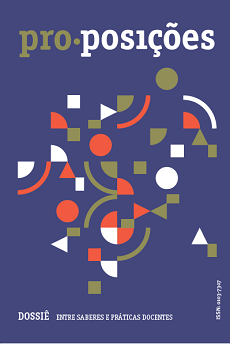Resumo
Este artigo analisa o discurso de diferentes atores no momento do debate sobre o novo currículo de História nacional no Quebec de 2006 a 2010. Duas posições opostas quanto ao lugar do saber histórico e sua construção são identificadas: uma visa ao desenvolvimento de habilidades intelectuais associadas ao pensamento histórico; a outra enfatiza a transmissão e a memorização de uma trama narrativa rígida.
Abstract
This article analyzes different actors’ discourses during the debate on the new national History curriculum in Quebec, held from 2006 to 2010. Two opposite positions regarding the place of history instruction and its construction were identified: one that aims to develop intellectual skills associated with historical thinking and one that focuses on the transmission and storage of a fixed narrative.
Key words History. Curriculum. Knowledge. Citizenship. Intellectual skill
Referências
ANGERS, D. et al. Le programme d’histoire au secondaire – Une nouvelle version à recentrer. Le Devoir, p. A7, 28 sept. 2006.
BOUHON, M. Les représentations sociales des enseignants d’histoire relatives à leur discipline et à leur enseignement. Tese (Doutorado) – Université Catholique de Louvain-La-Neuve, Louvain-La-Neuve, 2009.
Cardin, J.-F. Histoire et éducation à la citoyenneté: une idée qui a la vie dure. In: Mellouki, M. (Dir.). Promesses et ratés de la réforme de l’éducation au Québec. Québec: Presses de l’Université Laval, 2010a. p. 191-220.
CARDIN, J.-F. Quebec’s New History Program and “la Nation”: A Commented Description of a Curriculum Implementation. In: NAKOU, I.; BARCA, I. (Dir.). Contemporary Public Debates Over History Education. Charlotte, NC: Information Age Publishing, 2010b. p. 185-201.
CLARK, A. Teaching the Nation. Politics and Pedagogy in Australian History. Victoria: Melbourne University Press, 2006.
COALITION POUR L’HISTOIRE. La coalition pour l’histoire demande une révision en profondeur des contenus de programme en histoire. 2009. Disponível em: http:// www.coalitionhistoire.org/contenu/la_coalition_pour_l_histoire_demande_une_revision_en_profondeur_des_contenus_de_programme_e_0.
DAGENAIS, M.; LAVILLE, C. Le naufrage du projet de programme d’histoire “nationale”: retour sur une occasion manquée accompagné de considérations sur l’éducation historique. Revue d’histoire de l’Amérique Française, v. 60, n. 4, p. 517-550, 2007.
Demers, S.; Lefrançois, D.; Éthier, M.-A. Un aperçu des écrits publiés en français et en anglais depuis 1990 à propos des recherches en didactique sur le développement de la pensée historique au primaire. In: Cardin, j.-F.; Éthier, M.-A.; Meunier, A. (Dir.). Histoire, musées et éducation à la citoyenneté. Québec, QC: Éditions MultiMondes, 2010. p. 213-245.
ÉTHIER, M.-A.; Lefrançois, D. L’enseignement de l’histoire au Québec: perspectives historiques et critiques sur les programmes scolaires. Cartable de Clio, Lausanne, n. 10, p. 147-165, 2010.
GUAY, L. Le débat sur les nouveaux programmes d’histoire. Quelle histoire!. Le Devoir, p. B5, 2 sept. 2006.
GOUVERNEMENT DU QUÉBEC. L’école, tout un programme: énoncé de politique éducative. Québec: Ministère de l’éducation, 1997.
GOUVERNEMENT DU QUÉBEC. Programme de formation de l’école québécoise: enseignement secondaire, premier cycle. Québec: Ministère de l’éducation des loisirs et des sports, 2006.
GOUVERNEMENT DU QUÉBEC. Programme de formation de l’école québécoise: enseignement secondaire deuxième cycle. Québec: Ministère de l’éducation des loisirs et des sports, 2007. Granatstein, J. L. Who killed Canadian history? Toronto: Harper Collins Publishers, 1998.
Grever, M.; Stuurman, S. Beyond the Canon. History for the 21st Century. Basingstoke: Palgrave Macmillan, 2007.
Laville, C. Historical Consciousness and Historical Education: What to Expect from the First for the Second. In: SEIXAS, P. (Dir.). Theorizing Historical Consciousness. London: University of Toronto Press, 2004. p. 165-182.
Laville, C. L’économie, la religion, la morale: de nouveaux terrains des guerres d’histoire scolaire. Cartable de Clio, Lausanne, n. 9, p. 128-144, 2009.
LAVILLE, C. Un cours d’histoire pour notre époque. Le Devoir, p. A7, 2 mai 2006.
Macintyre, S.; Clark, A. The History Wars. Carlton: Melbourne University Press, 2003.
MOSCOVICI, S. Notes towards a description of social representations. European Journal of Social Psychology, n. 18, p. 211-250, 1988.
Nash, G. B.; Crabtree, C.; Dunn, R. E. History on Trial: Culture Wars and the Teaching of the past. New York: Vintage Books, 2000.
Rosenzweig, L. W.; Weinland, T. P. New Directions of the History Curriculum: A Challenge for the 1980s. The History Teacher, Long Beach, CA, n. 19, p. 263-277, 1986.
SEIXAS, P. Schweigen! Die Kinder! Or, Does Postmodern History Have a Place in the Schools?. In: SEIXAS, P.; STEARNS, P.; WINEBURG, S. (Dir.). Knowing, Teaching and Learning History: National and International Perspectives. New York: New York University Press, 2000, p. 19-37.
VAN VAN DER MAREN. Méthodes de recherche pour l’éducation. Bruxelles: De Boeck, 1996.
A Proposições utiliza a licença do Creative Commons (CC), preservando assim, a integridade dos artigos em ambiente de acesso aberto.

